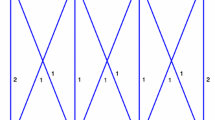Abstract
Algebraic attacks have proved to be an effective threat to block and stream cipher systems. In the realm of algebraic attacks, there is one major concern that, for a given Boolean polynomial f, if f or f + 1 has low degree annihilators. Existing methods for computing all annihilators within degree d of f in n variables, such as Gauss elimination and interpolation, have a complexity based on the parameter \(k_{n, d} = \sum_{i=0}^{d}{{{n}\choose{i}}}\), which increases dramatically with n. As a result, these methods are impractical when dealing with sparse polynomials with a large n, which widely appear in modern cipher systems.
In this paper, we present a new tool for computing annihilators, the characters w.r.t. a Boolean polynomial. We prove that the existence of annihilators of f and f + 1 resp. relies on the zero characters and the critical characters w.r.t. f. Then we present a new algorithm for computing annihilators whose complexity relies on k′ f,d , the number of zero or critical characters within degree d w.r.t.f. Since k′ f,d ≪ k n, d when f is sparse, this algorithm is very efficient for sparse polynomials with a large n. In our experiments, all low degree annihilators of a random balanced sparse polynomial in 256 variables can be found in a few minutes.
This work is partly supported by the National Natural Science Foundation of China under Grant No. 60970152, the Grand Project of Institute of Software: YOCX285056, and National 863 Project of China(No. 2007AA01Z447).
Access this chapter
Tax calculation will be finalised at checkout
Purchases are for personal use only
Preview
Unable to display preview. Download preview PDF.
Similar content being viewed by others
References
Courtois, N.T., Pieprzyk, J.: Cryptanalysis of block ciphers with overdefined systems of equations. In: Zheng, Y. (ed.) ASIACRYPT 2002. LNCS, vol. 2501, pp. 267–287. Springer, Heidelberg (2002)
Courtois, N.: Fast algebraic attacks on stream ciphers with linear feedback. In: Boneh, D. (ed.) CRYPTO 2003. LNCS, vol. 2729, pp. 176–194. Springer, Heidelberg (2003)
Courtois, N., Meier, W.: Algebraic attacks on stream ciphers with linear feedback. In: Biham, E. (ed.) EUROCRYPT 2003. LNCS, vol. 2656, pp. 346–359. Springer, Heidelberg (2003)
Faugère, J.C., Joux, A.: Algebraic cryptanalysis of hidden field equation (HFE) cryptosystems using Gröbner bases. In: Boneh, D. (ed.) CRYPTO 2003. LNCS, vol. 2729, pp. 44–60. Springer, Heidelberg (2003)
Meier, W., Pasalic, E., Carlet, C.: Algebraic attacks and decomposition of boolean functions. In: Cachin, C., Camenisch, J.L. (eds.) EUROCRYPT 2004. LNCS, vol. 3027, pp. 474–491. Springer, Heidelberg (2004)
Armknecht, F., Cayrel, P.L., Gaborit, P., Ruatta, O.: Improved algorithm to find equations for algebraic attacks for combiners with memory. In: Third International Workshop on Boolean Functions: Cryptography and Applications, Proceedings of BFCA, pp. 81–98 (2007)
Armknecht, F., Carlet, C., Gaborit, P., Kunzli, S., Meier, W., Ruatta, O.: Efficient computation of algebraic immunity for algebraic and fast algebraic attacks. In: Vaudenay, S. (ed.) EUROCRYPT 2006. LNCS, vol. 4004, pp. 147–164. Springer, Heidelberg (2006)
Didier, F., Tillich, J.P.: Computing the algebraic immunity efficiently. In: Robshaw, M.J.B. (ed.) FSE 2006. LNCS, vol. 4047, pp. 359–374. Springer, Heidelberg (2006)
Faugère, J.C.: A new efficient algorithm for computing Gröbner bases without reduction to zero(F5). In: Proceedings of the 2002 international symposium on Symbolic and algebraic computation, pp. 75–83 (2002)
Stegers, T., Buchmann, J.: Faugere’s F5 algorithm revisited. Thesis for Diplom-Mathematiker (2005)
Faugère, J.C., Ars, G.: An algebraic cryptanalysis of nonlinear filter generators using Gröbner bases. Rapport de Recherche INRIA, 4739 (2003)
Becker, T., Weispfenning, V., Kredel, H.: Gröbner Bases: a computational approach to commutative algebra. Springer, Heidelberg (1991)
Author information
Authors and Affiliations
Editor information
Editors and Affiliations
Rights and permissions
Copyright information
© 2010 Springer-Verlag Berlin Heidelberg
About this paper
Cite this paper
Xu, L., Lin, D., Li, X. (2010). A New Efficient Algorithm for Computing All Low Degree Annihilators of Sparse Polynomials with a High Number of Variables. In: Kwak, J., Deng, R.H., Won, Y., Wang, G. (eds) Information Security, Practice and Experience. ISPEC 2010. Lecture Notes in Computer Science, vol 6047. Springer, Berlin, Heidelberg. https://doi.org/10.1007/978-3-642-12827-1_10
Download citation
DOI: https://doi.org/10.1007/978-3-642-12827-1_10
Publisher Name: Springer, Berlin, Heidelberg
Print ISBN: 978-3-642-12826-4
Online ISBN: 978-3-642-12827-1
eBook Packages: Computer ScienceComputer Science (R0)




